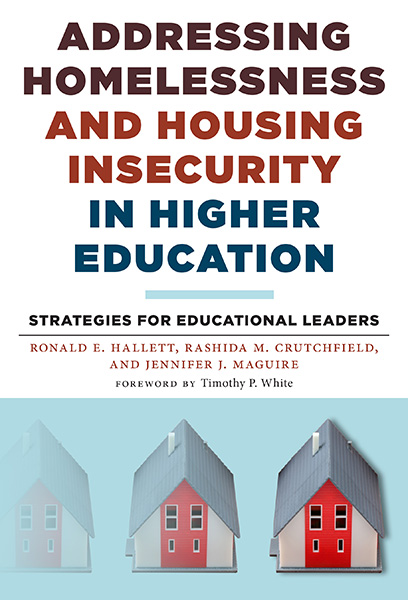Professors: Request an Exam Copy
Print copies available for US orders only. For orders outside the US, see our international distributors.
Ronald E. Hallett, Rashida M. Crutchfield, Jennifer J. Maguire
Foreword by: Timothy P. White
Publication Date: June 21, 2019
Pages: 160

This book helps educational leaders provide support for students who face significant barriers to college access, success, and retention. The authors offer research-based, practical guidance to allow readers to evaluate these issues within their local context, create and implement a plan of action, and sustain those efforts over time. Vignettes based on interviews with students experiencing homelessness and housing insecurity and contributions from practitioners are woven throughout the text to illustrate promising-practice recommendations. Topics include trauma-informed frameworks, policies affecting homelessness and housing insecurity, transitioning students to college, supporting college retention, collaborations and partnerships, and life after college. This practical resource can be used as a professional development tool for student affairs, academic affairs, health and wellness centers, and other campus-based support services.
Book Features:
Ronald E. Hallett is a professor of organizational leadership in the LaFetra College of Education at the University of La Verne, a research associate in the Pullias Center for Higher Education at the University of Southern California, and coauthor of Serving Students Who Are Homeless. Rashida M. Crutchfield is an associate professor in the School of Social Work at California State University, Long Beach. Jennifer J. Maguire is an associate professor in the Department of Social Work at Humboldt State University.
"The authors provide an excellent overview of housing insecurity and homelessness, which can ground your perspective on who our students are and the experiences they might be enduring. This book provides context, but it also offers tangible suggestions for how you can develop or expand your philosophical, practical, and political efforts to address the needs of students."
—From the foreword by Timothy P. White, chancellor of The California State University
“These skilled authors provide invaluable insights into homelessness and guidance for how we can respond. This is important work that should be shared throughout higher education!” —Peter Miller, University of Wisconsin-Madison
“With this book Hallett, Crutchfield, and Maguire demonstrate a compassionate expertise that furthers the understanding of homelessness and housing insecurity among college students. Their broad, nuanced, and inclusive definition of homelessness and housing insecurity leads to a broad, nuanced, and inclusive discussion of the issue. The vignettes throughout the book humanize the issue, and the authors provide practical tools for assessing and addressing the issue within a local context in a trauma-informed and sensitive manner. This is a must-read for higher education professionals who want to support students affected by issues of housing insecurity and homelessness.”
—Robert D. Reason, Iowa State University
“The authors highlight a long unaddressed issue in higher education - homelessness and housing insecurity. The book reminds us that higher education was established for the rich and elite and our lack of attention to issues that plague the poor is part of our institutional DNA that we must overcome to serve today’s students. The book not only enlightens leaders but also helps campuses to develop meaningful action plans through local evaluation and planning.” —Adrianna Kezar, Dean's Professor of Leadership, co-director Pullias Center, and director of Delphi Project, University of Southern California
Contents
Foreword Timothy P. White ix
1. Introduction 1
Size of the Issue 2
Importance of Higher Education for Future Stability 5
You Play an Important Role 6
Preview of the Book 6
2. Housing Insecurity in Higher Education 8
Higher Education Housing Continuum 8
Categories of Housing Status in the Continuum 12
Person-First Language 22
Conclusion 23
3. Social and Political Context 24
Economic Context 24
Social Context 26
Impact on Education 29
Policies Framing Higher Education 31
Conclusion 39
4. Trauma-Informed and Sensitive Colleges 43
What Is (and Is Not) Trauma 43
Becoming a Trauma-Informed and Sensitive College 46
Conclusion 50
5. Localizing Housing Insecurity 52
Gathering a Team 53
Learning About the Issue 58
Conducting a Self-Study 60
Convincing Administration to Move to Evaluation Stage 65
Conclusion 66
6. Evaluating Housing Insecurity on Your Campus 68
Where to Begin 69
Comprehensive Evaluation Design 70
Using Existing Institutional Surveys 72
Evaluation Tools 72
Outcomes 76
Student Voices 77
Recruiting Participation 79
Writing the Final Report 80
Lessons Learned 82
Conclusion 85
7. Implementing Strategies to Improve Student Experiences 86
Student Input and Support 87
Students Considering and Enrolling in College 89
Developing a Single Point of Contact (SPOC) Model on Campus 90
Leveraging Existing Services 94
Developing New Programs to Address Housing Insecurity 99
Responses to Food Insecurity 104
Career Services and Life After Graduation 108
Potential Roadblocks 108
Conclusion 109
8. Sustaining Efforts Over Time 111
Avoid Isolated Services 112
Maintain Community Partnerships 112
Integrate Basic Needs Security into Strategic Planning 112
Connect with Advancement and Philanthropy Offices 113
Provide Training for Faculty and Staff 115
Use Media to Advance Your Message 116
Advocate for Higher Education Policies 116
Meet Regularly 117
Conduct Continuous Evaluation 118
Conclusion 118
9. Looking Forward 120
This Work Is Hard, But It Matters 120
Take Care of Yourself 121
Share Your Story 123
Appendix A: Measuring Homelessness and Housing Insecurity 125
Appendix B: Assessing Student Supports 127
Appendix C: Meeting Students’ Basic Needs 131
Appendix D: California State University, Long Beach, Basic Needs Program 133
References 135
Index 139
About the Authors 147
Professors: Request an Exam Copy
Print copies available for US orders only. For orders outside the US, see our international distributors.